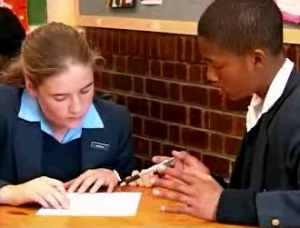Tips for Teachers
The Hidden Curriculum: what habits of relating to others do you teach?
 As educators we teach a lot more than learning area content. We teach our learners how they should relate to others and what attitudes, values and behaviours they should practice when they communicate. We don’t teach this in what we say; we teach learners habits of relating through what we have them do in our classrooms.
As educators we teach a lot more than learning area content. We teach our learners how they should relate to others and what attitudes, values and behaviours they should practice when they communicate. We don’t teach this in what we say; we teach learners habits of relating through what we have them do in our classrooms.
How do you want your learners to relate to others in their personal and professional lives? Do you want them to ignore others? Do you want them to compete against each other? Or do you want them to value other people’s contributions and work in concert with them?
You may not know it, but you communicate your response to these queries by how you manage your classroom, pose questions and have learners interact with others. It’s all in the task design. Each task has a goal structure: individualistic, competitive or co-operative. Which one do you promote?
If you keep asking learners to do individual assignments, then your message is that there is no benefit in working with others. It’s better, perhaps even safer to work on one’s own, and the teacher is the only person to be concerned with.
If the majority of your assignments require the learners to do better than the others in order to get good grades, then you are teaching them that other people are obstacles to their success.
When you ask such questions as “Who can tell me . . ?” “Who has the best . . .” you are pitting learners against each other to be noticed and acknowledged. Their goal then is to win the teacher’s approval if they get the right answer. This basic social need to be seen and heard, over-rides any desire to get information or understand the topic.
If, on the other hand, you give regular assignments that require learners to work with others for mutual gain and enrichment, then you are teaching them the co-operative way of relating. When we say “Put your heads together and make sure everyone can answer this question,” learners’ basic social needs to be seen, hard and valued can be met by their peers. In this instance, their goal becomes to listen and contribute for the sake of gaining knowledge together.
So what message do you want to communicate to your learners? Do your task goals teach what you hope your learners will practice when they relate to others?
| Co-operative goals teach that the way to make contact is by joining with others. By pursing these goals we learn to pull together toward mutually beneficial goals. We are supports for each other’s success. | Competitive Goals teach that the way to make contact is by pitting ourselves against others. By pursuing these kinds of goals we learn to fight against each other, resist, or block others. Others are seen as a threat to our success. We compare ourselves to others, and only by being better than the others do we feel successful. This is the recipe for perpetual insecurity: we continually compare ourselves to others to judge our value. This may be why learners can end up fighting about who has the right answer. | Individualistic Goals teach that we should avoid making contact with others and that to get anywhere in this world we need to be able to do it on our own. If you can’t do it on your own, then you’re a loser. Asking for help suggests weakness. |
Co-operative Learning as a way of connecting with others
One significant way of viewing Co-operative Learning is that it teachers people how to make contact with others in constructive and productive ways. Connecting with others is a basic need for survival and requirement of living in a society. How we do it depends on what we’ve been taught and have become used to. How we relate becomes a habit. We can make contact by fighting against one another or by joining together. By being aware of the ‘hidden messages’ that our learning tasks communicate, we can consciously teach our learners how to join with others toward achieving a common goal. If we regularly provide positive and enjoyable learning experiences where learners join their energies and talents, then imagine the kinds of relationships our learners would seek to develop and practice in their personal and professional lives! Wouldn’t this be a great contribution we could make to our nation and the world?
The critical role of educators in shaping the kind of people we become
We have a very important role to perform in our schools and classrooms. We are developing habits of behaviour that people will practice once they leave our care and formal education. Let’s make sure our classrooms model co-operative, caring, and respectful interactions that seek to support one another.
Click here: The Power of Paraphrasing Article


